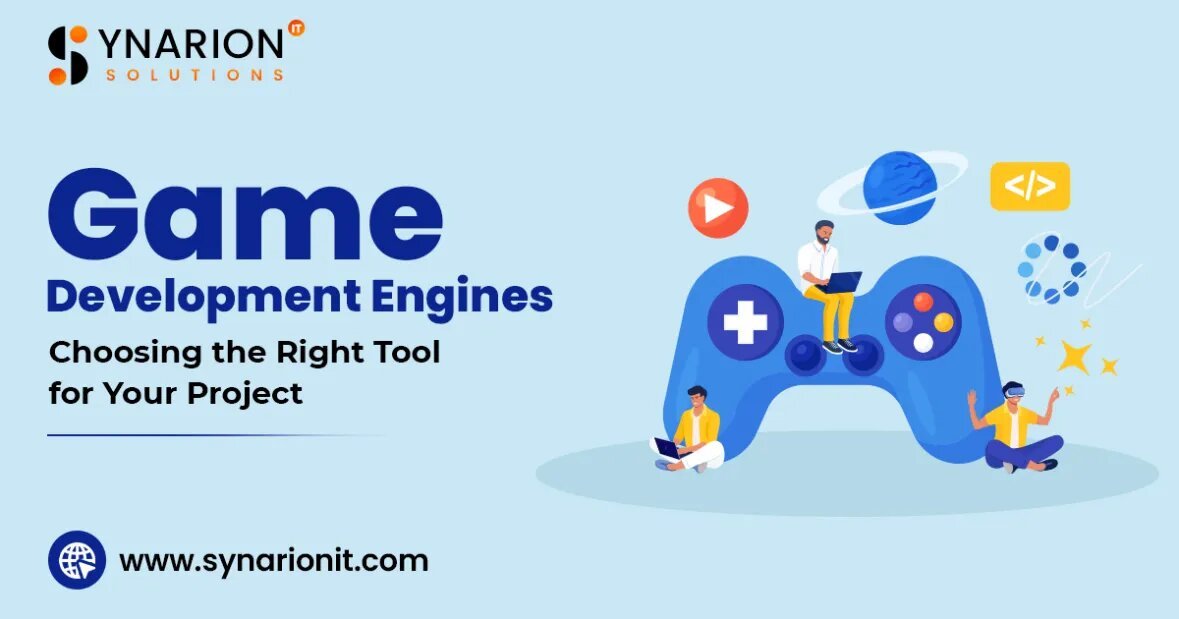When it comes to creating a video game, one of the most critical decisions developers face is selecting the right game development engine. The choice of engine can significantly impact the overall game design, performance, and user experience. Whether you’re building a complex 3D open-world game, a simple 2D mobile game, or an immersive virtual reality experience, the game engine you choose will shape the development process from start to finish.
In this article, we will explore some of the most popular game development engines and help you understand how to choose the best one for your project. If you’re considering working with a game development company or opting for mobile game development in India, understanding these engines will ensure you make an informed decision that aligns with your project’s goals.
1. Unity: The Versatile Powerhouse
Unity is one of the most widely used game engines in the world today. Known for its versatility and ease of use, Unity is perfect for both beginners and experienced developers. Whether you are creating a 2D mobile game or a 3D adventure game, Unity provides all the tools you need to build rich, interactive experiences.
One of the standout features of Unity is its cross-platform capabilities, allowing you to develop games for multiple platforms such as PC, consoles, mobile, VR/AR, and even WebGL. Its large asset store, strong community support, and extensive documentation make it a popular choice for mobile game development in India and globally.
2. Unreal Engine: Best for High-End Graphics
For developers seeking photorealistic graphics and cutting-edge performance, Unreal Engine is a top contender. Created by Epic Games, Unreal Engine is widely regarded for its high-quality graphics rendering capabilities and advanced features. It is particularly suited for developing AAA games, virtual reality experiences, and any project where visual fidelity is crucial.
Unreal Engine offers robust support for both 2D and 3D games but truly excels in creating large, immersive environments with complex physics simulations. Its powerful Blueprint visual scripting system also makes it accessible for non-programmers, while still providing deep customization for experienced developers.
3. Godot: Open-Source and Developer-Friendly
Godot is an open-source game engine that has gained popularity in recent years due to its user-friendly interface, flexibility, and no licensing fees. With support for both 2D and 3D games, Godot is a great option for indie developers and small studios. It features an intuitive scene system, drag-and-drop functionality, and a unique scripting language, GDScript, which is similar to Python.
Godot’s open-source nature means you have complete control over the code and can make modifications as needed. This engine is ideal for developers who want a lightweight engine that is completely free to use without worrying about royalties or licensing costs.
4. Cocos2d: Ideal for 2D Games
Cocos2d is a popular open-source game development engine specifically designed for building 2D games. It’s lightweight and offers great performance, making it an excellent choice for mobile game development. With Cocos2d, you can create games for multiple platforms, including iOS, Android, Windows, and macOS, and the engine supports both native and web-based games.
This engine comes with a variety of tools to help developers create interactive user interfaces, animations, and special effects. If you are planning to develop a mobile game or a simple 2D game with moderate graphical complexity, Cocos2d provides an efficient solution with fewer performance concerns than heavier 3D engines.
5. CryEngine: For High-Quality Visuals and Realism
If your goal is to create photorealistic 3D environments with breathtaking visuals, CryEngine is an excellent choice. Known for powering games like Crysis, CryEngine is known for its stunning graphics capabilities, particularly in creating realistic outdoor environments, complex terrain, and lighting systems.
While CryEngine is more challenging to learn compared to other engines, its robust toolset, including features like AI, physics simulation, and post-processing effects, make it a solid choice for developers aiming for high-end visuals. CryEngine is ideal for AAA games or projects that require cutting-edge performance and realism.
6. GameMaker Studio 2: Simple and Effective for 2D Games
For developers who want to create simple yet effective 2D games, GameMaker Studio 2 is a fantastic option. Its drag-and-drop functionality and scripting language (GameMaker Language) allow both beginners and experienced developers to create a wide range of 2D games efficiently.
GameMaker Studio is particularly popular for creating mobile games, platformers, and indie games, and it supports export to multiple platforms, including iOS, Android, Windows, and consoles.
7. Amazon Lumberyard: Built for Online Multiplayer Games
Amazon’s Lumberyard is a free, cross-platform game engine designed with a focus on online multiplayer games. It integrates seamlessly with Amazon Web Services (AWS) and Twitch, making it a great choice for developers who want to build games with cloud-based features, multiplayer support, and live-streaming capabilities.
Read More Article: How to Choose the Right Software Development Methodology?
8. Construct 3: No-Code Game Development
For developers without a coding background or those who want to rapidly prototype 2D games, Construct 3 is a great choice. It is a no-code game engine that relies on visual programming, enabling users to create games by dragging and dropping elements.
Construct 3 is designed to be beginner-friendly while still powerful enough to create fully functional games. While it may not offer the depth of other engines for complex projects, it’s perfect for small indie games, mobile apps, and prototyping. If you’re seeking a quick mobile game development in India solution, Construct 3 could be ideal for developing simple games with minimal coding experience.
Conclusion: Choosing the Right Engine for Your Game
The game engine you choose plays a vital role in the success of your project. Factors like the type of game (2D or 3D), graphics complexity, target platform, and your team’s expertise should all be considered when making your decision. Whether you’re looking for a game development company to collaborate with or you plan to develop a mobile game in India on your own, each engine has its strengths and is suited to different kinds of projects.
For beginners and indie developers, Unity and Godot are excellent choices due to their ease of use and flexibility. For AAA projects requiring top-notch graphics, Unreal Engine and CryEngine are the go-to solutions. If you’re developing a simple 2D mobile game, Cocos2d or GameMaker Studio 2 may be the best fit. Consider your project’s specific needs, and select the engine that best aligns with your vision for the game.



